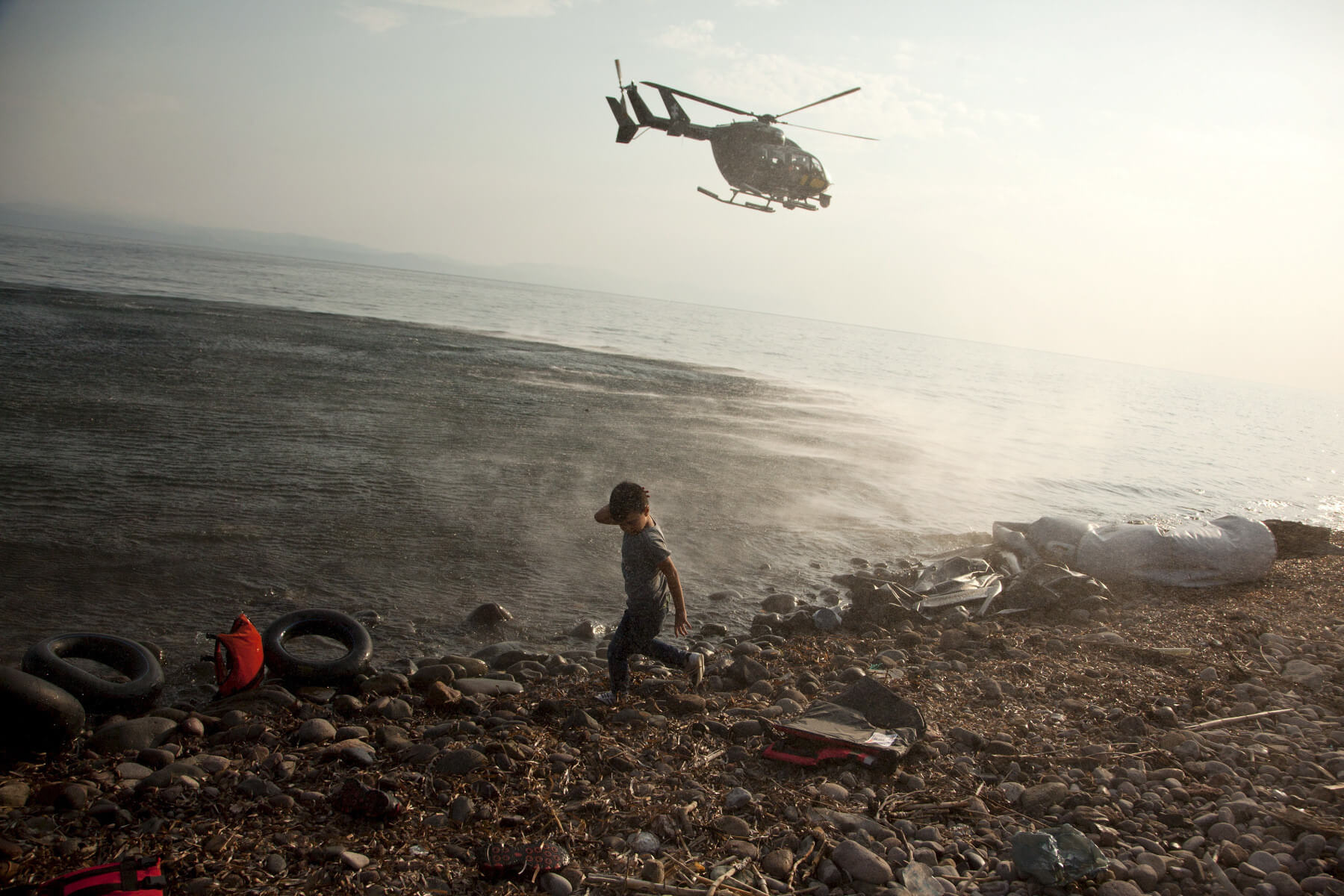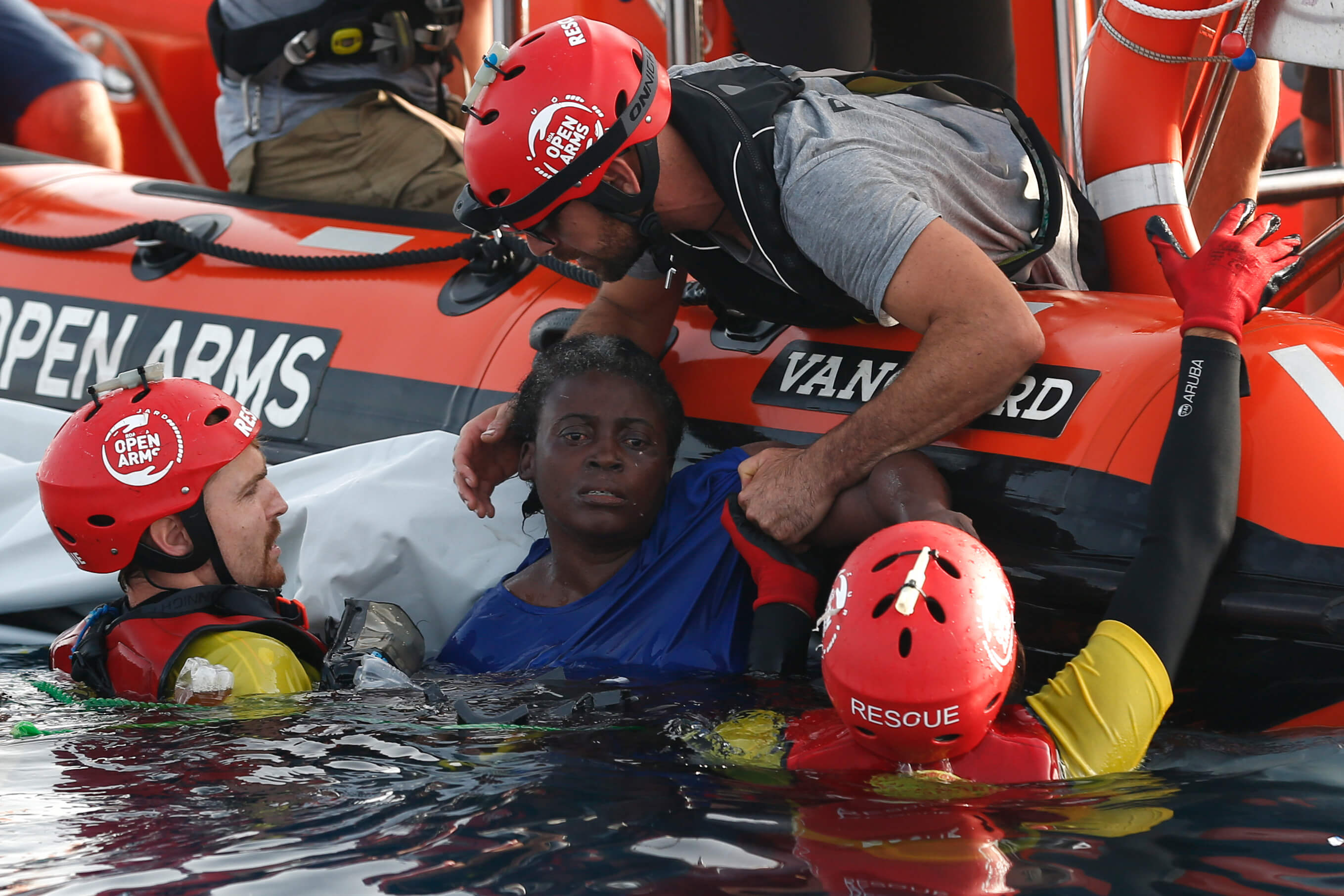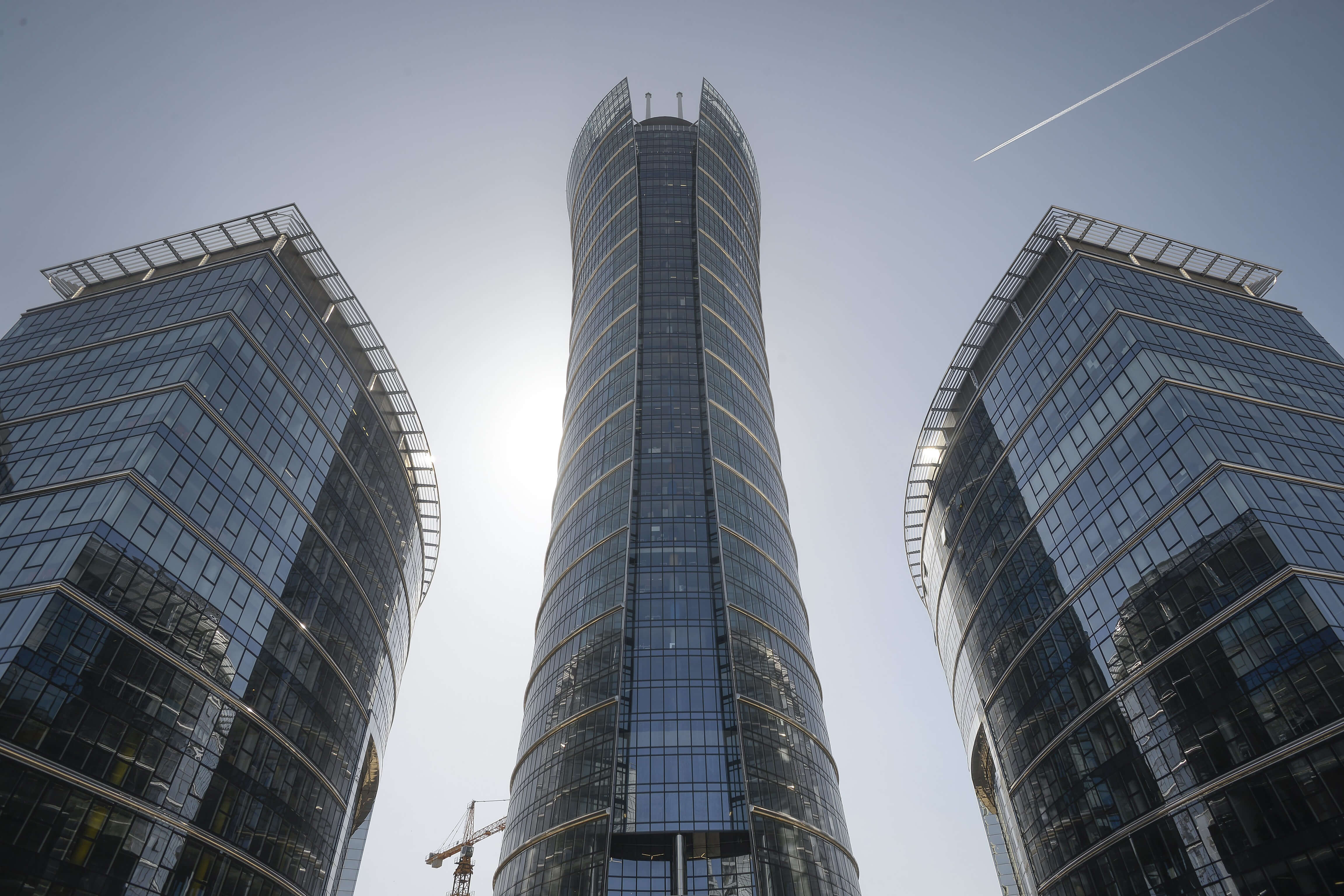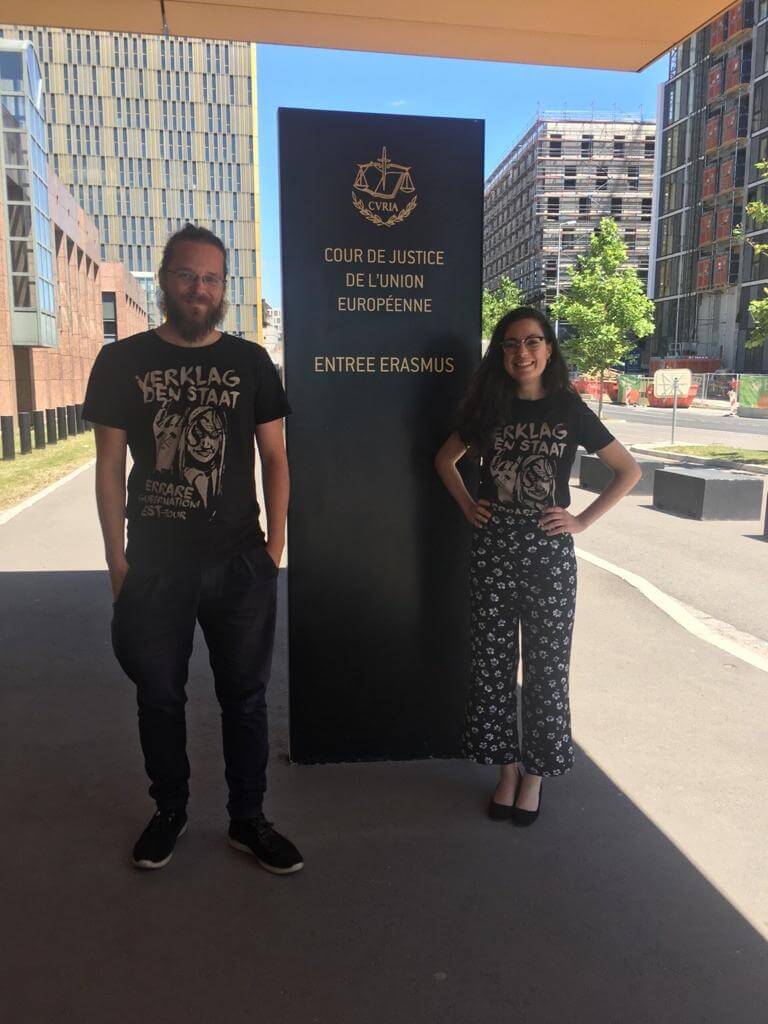
Frontex: watching the watchers
Shortly before the European elections, the EU rushed through a reform of the border agency Frontex. The agency is becoming more powerful than ever. Hardly anyone can control whether the agency respects basic rights of refugees. Whether or not it really tries to save lives at sea. Nonetheless, transparency activists try their best – in their very own way. A joint investigation with the ARD magazine Report Munich.
Berlin, June 18th, 2017. Arne Semsrott writes to the EU border police Frontex. “I requested documents containing the following information: a list of all ships currently used by Frontex in the central and eastern Mediterranean.”
Semsrott is a journalist and freedom of information activist. You could also say: Activist for transparency.
Three weeks later, on July 12th, 2017, in Madrid. Luisa Izuzquiza sends a request to Frontex. She asks for documents pertaining to a meeting between the Frontex chief and representatives of Italy and other member states. Izuzquiza is also an activist for freedom of information.
That summer, Arne Semsrott and Luisa Izuzquiza are moved by the same thing: the conflict between private maritime rescuers and European border surveillance on the Mediterranean, be it Frontex or the Italian Coast Guard. While this summer’s arrests of Captain Carola Rackete left Europe concerned, it was in 2017 that the Italian authorities confiscated the German rescue ship Iuventa.
The joint investigation was broadcast August 6th by the ARD program Report München (in German).
The story deals with a bad suspicion, reported by sea rescuers behind closed doors, and which troubles Europe’s conscience: Allegations that European border surveillance vessels deliberately stay away from places where refugee boats capsize in the Mediterranean, causing people to sink and drown in the Mediterranean. Could this be?
Frontex repeatedly emphasizes that it adheres to international maritime law. Furthermore, the sea rescuers can not prove their suspicions. This is what motivates Semsrott and Izuzquiza: They want to use the means available to them to make events on the sea transparent. Because when a refugee boat or a rescue vessel or a coast guard calls for help, fundamentally different reports surface after each incident. It is near impossible for outsiders to understand what actually happened.
A reality that Semsrott and Izuzquiza do not accept. They believe that the data on ship movements and positions, the situational and operational reports of Frontex, the logs of the consultations between governments regarding migration policy should be freely accessible by anyone. So that every person has the ability to monitor the monitors. This is the story of their struggle. They have chosen a powerful adversary.
Frontex rejects the accusation of disregarding human rights. “Frontex is very concerned about the respect of human rights,” says spokesman Krzysztof Borowski in an interview with Report Munich. “Within Frontex we have different mechanisms to ensure that human rights are respected during our operations.”

Izuzquiza lives in Madrid, when in 2011 the so-called Indignados, the “indignant”, started their protests. Spain is on its knees after the economic crisis and the Indignados are holding accountable a political class they consider to be deeply corrupt and unrepresentative. Izuzquiza joins them. A core demand of the protests: more transparency. A demand Izuzquiza later commits herself to with skin and hair. “Transparency is a very important tool in a democracy, which allows for accountability and political participation,” she says today.
Izuzquiza lives only three minutes away from the office of the Spanish organization Access Info. An organization committed to greater transparency of the state. Izuzquiza approached them on an off chance in early 2014 and got a job.
When more and more people fled the Syrian civil war and arrived in Europe in 2015, she also commits herself to helping them. She does volunteer work in refugee camps in Greece. Finally, she starts to unite the fight for transparency and commitment to refugees.
In doing so, she quickly finds herself facing Frontex. This at a time at which only few people were aware of the border agency headquartered in Warsaw, far away from the happenings in Brussels. “Frontex clearly stood out, for the number of requests for information was very low and Frontex’ answers were very vague”, recalls Izuzquiza. “They wrote responses without taking into account any legal arguments.”
The European Union is rapidly expanding the protection of its external borders. At the heart of its efforts is the EU agency Frontex, which has grown since its inception in 2004 like no other EU body. At that time, Frontex initiated its work with a budget of six million euros. In 2021, their budget will amount to approx. 1.6 billion euros. Instead of its currently around 1,500 employees, in the future, 10,000 Frontex employees will be assigned to border protection at any time. While in 2015 Frontex organized the deportation of 3,500 people, in 2017 this number had already risen to 13,000.
Power is difficult to measure, especially in terms of numbers. But what Frontex does has a direct impact on people in need. The agency is likely the most powerful authority in the EU in this regard.
And Frontex continues to grow and continues to become more independent from EU member states. The border authority may buy its own ships, aircraft and vehicles. Its officials are now allowed to independently carry out border checks and collect data from migrants. Frontex independently concludes agreements with countries such as Serbia, Nigeria and Cape Verde and sends liaison officers to Turkey. While Frontex was initially entrusted with tasks such as risk analysis, today the agency is active on all external borders of the EU. It coordinates both operations in the Mediterranean and dealing with newly arriving refugees in EU countries and other countries.
However, there is no de facto parliamentary control of Frontex. The European Parliament can only control the authority indirectly – by granting the agency less resources through its budgetary committee. “It calls for more parliamentary scrutiny,” says Green MEP Erik Marquardt. “Frontex is now an agency that can use firearms.”
It’s a small number of activists who are fighting for improved freedom of information in Europe. Sooner or later you will run into each other.
In early 2016, Izuzquiza’s organization brings together activists from ten countries for a meeting in Madrid. Also present is the now 31 year-old Arne Semsrott from Berlin.
Since 2006, an Information Freedom Act – called IFG in Germany –, has been in force in Germany. Every citizen – i.e. not just journalists – can ask federal ministries and authorities for documents. Semsrott works for FragDenStaat, a platform that forwards freedom of information (FOI) requests to the relevant authorities on behalf of citizens.
Soon after the meeting in Madrid, Semsrott starts a so-called mass request. Activists are calling on the public to make FOI inquiries. This is meant to pressure those authorities who often refuse to hand over documents despite being obliged to provide information.
Semsrott launches the mass request “FragDenBundestag”, thereby achieving that Parliament publishes the reports of the scientific service of the Bundestag from that point on.
“I found it exciting that such a request could result in the publication of the documents,” says Izuzquiza. She writes Semsrott and asks if there is any mention of migration policy in the reports. They stay in touch.
Journalists also file FOI inquiries. But while they usually do not want the competition to know what they’re working on, activists like Izuzquiza always make their requests public through platforms like FragDenStaat or AsktheEU.org. And: They obtain court rulings against stubborn authorities that others may later invoke and make reference to. They are pioneers of transparency.
In September of 2017, Izuzquiza and Semsrott finally get together: They ask about the ship positions of a Frontex operation on the Mediterranean.
They want to know: are they moving along an area in the Mediterranean, in which there is nothing to do? Do they avoid the places where they could encounter people in distress who require help and transport to Europe?
Ship data is a secret well kept by Frontex. The agency argues that people smugglers may be able to come up with new strategies if too many details become known about Frontex’ operations.
Frontex denies the request. The activists file an appeal.

Semsrott is in the middle of preparing a lawsuit when his phone rings. An employee of Frontex is on the line. “He said that if we withdraw the appeal, he would somehow send us the data,” recalls Semsrott.
But the activists do not agree. They want to receive the data by official means. They want to achieve what the Frontex caller obviously wanted to prevent with his offer of an informal agreement: a legal precedent that others may later make reference to. Thus they file a lawsuit. It is the first ever disclosure lawsuit against Frontex.
Frontex rejects this version of events. It says that a Frontex official did call Semsrott but only to explain that Semsrott could also file a request for information through the media office of Frontex, which handles journalists’ requests.
The email that Semsrott sent to Izuzquiza after the phone call shows how he perceived the call as an attempt to avoid a precedent under freedom of information rules.
“Frontex just called me to say that they won’t give us the information by early January. (…) Oh, also they said that an “informal request” would be possible, i.e. an e-mail not under (freedom of information regulation) 1049/2001,” he wrote.
While waiting for the appointment at the European Court of Justice in Luxembourg, they are more successful elsewhere. Frontex states in its charter that it must respect the fundamental rights of refugees.
A Fundamental Rights Officer is to ensure that. She has only nine employees. In 2017, the agency spent in 15 times more money on public relations work than on the protection of fundamental rights. The agency even spent more on mere letter postage than on the protection of basic rights.
The one thing the guardian of fundamental rights at Frontex certainly does: she writes reports. All incidents across Europe’s borders, which are reported by Frontex officials, come across her.
There are dozens of them each year, which the commissioner records in so-called deficiency reports. And Izuzquiza and Semsrott gradually receive them – a total of 600 of them.
The reports give a rare insight into the way of thinking of this EU authority.
For example, in spring of 2017, the Fundamental Rights Officer reported conflicts with the Hungarian police to the Frontex Governing Council, which also includes German government officials.
They had discovered ten refugees, all aged 10 to 17, in the border area near the Serbian town of Horgoš and sent a police dog at them. The animal had bitten three of the young refugees, reported the officer.
The police had penetrated into Serbian territory and attacked members of the group with batons and pepper spray. Four refugees were picked up and beaten unconscious after further attacks. Frontex, which cooperates with the Hungarian border police, brought the authorities to the case – without results.
That’s not unusual. A year earlier, the officer reported on a Moroccan who was arrested and ill-treated by Hungarian police on February 8th. Officials had also stolen 150 euros from him. The “extremely credible” statements of the Moroccan were passed on by Frontex to the Hungarian authorities. In this case, too, nothing was done. “The investigation was discontinued,” wrote the fundamental rights officer.
The records include countless cases of migrants found dead at the European external borders by border guards, rape in refugee camps and assault by border guards of member countries.
Izuzquiza and Semsrott decide to meet the Fundamental Rights Officer: the German Annegret Kohler. She holds the office on an interim basis. Her predecessor took sick leave. Izuzquiza writes her.
And Kohler actually agrees to a meeting. Izuzquiza is surprised. “She was new to the position, I thought. Maybe she just did not check who we are,” says Izuzquiza.
In January of this year, the two activists drove to Warsaw. In view of the dramas in the Mediterranean, one thing was nearly forgotten: Originally, the authority was supposed to keep an eye on the then still new EU external borders in the East. The Polish Ministry of the Interior provided Frontex its headquarters in Warsaw, away from the EU institutions in Brussels and Strasbourg, but close to the borders with Belarus, Ukraine and Russia.

Im neunten Stock des gläsernen Frontex-Wolkenkratzers am Europa-Platz in der Warschauer Innenstadt treffen Izuzquiza und Semsrott Annegret Kohler. Es ist das erste Mal, dass sie eine Angestellten von Frontex persönlich begegnen. „Das Gespräch war gut, viel ehrlicher als ich erwartet hatte,“ sagt Izuzquiza.
Izuzquiza and Semsrott meet Annegret Kohler on the ninth floor of the glassy Frontex skyscraper on Europa Square in Warsaw’s city center. It is the first time that they personally meet a Frontex employee. “The conversation was good, a lot more honest than I expected,” says Izuzquiza.
They mainly spoke about Hungary. Kohler voiced her anger against the national border police of Victor Orbán. “I do not know what kind of pressure we can currently exert,” she says.
Izuzquiza is surprised at how open the conversation is. There are no press officers, as is otherwise typical.
Whenever its work is criticized, Frontex generally refers to a complaint mechanism available to refugees. In practice, however, it is largely meaningless.
In 2018, merely ten complaints arose – from hundreds of thousands of people who came into contact with Frontex. Hardly anyone dares to file a complaint with Frontex. Concerned persons did not want to give their names, Kohler admits in the conversation, “because they fear that their name then appears in files and they will not receive access to the asylum procedure”.
Moreover, most of those affected are unaware that they could complain against Frontex, e.g. against the process of deportation by plane coordinated by the border agency. It is very difficult to find a moment in deportations in which one can sensitize concerned persons regarding the available complaint mechanism, says Kohler: “When is the right time to do that? Is it before the return or is it at the airport or on the plane?”
Yet that’s exactly where it would be necessary. According to a March 2019 report by the Fundamental Rights Officer, Frontex officials violated human rights standards and guidelines during deportation flights. It states that minors are deported unaccompanied by adults, although this is not permitted. In addition, the report clearly criticizes the use of handcuffs: “Shackles were not used in the manner necessary and also used disproportionately.”
According to its legal basis, Frontex can discontinue an operation if fundamental rights violations occur on site. However, Frontex boss Fabrice Leggeri does not consider this to be the case in Hungary. The presence of Frontex minimizes the risk of Hungarian officials becoming violent, he said in a letter to non-governmental organizations calling for a withdrawal of officials from Hungary. At least Frontex employees have the opportunity to document incidents as long as they are present.
Even an infringement procedure by the European Commission against Hungary and a judgment of the European Court of Human Rights do not change the position of Frontex. Although it is clear that Hungary is violating the European Convention on Human Rights by means of asylum laws and deportations, Frontex has not ended its deployment in Hungary until today.
Hungary’s border troops are acting crazy – and Frontex watches.

The dispute over the sea rescue in the Mediterranean and the distribution of refugees among the member states are an ordeal for the European Union. The negotiations on a reform of the common European asylum system have been frozen for years. Unity in European politics is only found with regards to one thing: more money, more civil servants, more ships, more equipment for Frontex.
For example, one month before the European elections in May, the EU rushed through a reform of the regulation, which forms the legal basis for Frontex, in record time. The Commission, Parliament and Council needed just half a year to negotiate the regulation, 245 pages of migration and security policy. For comparison: The fiercely contested copyright reform and the basic data protection regulation each took the institutions six years from negotiation to implementation.
“With the new powers and direct control over personnel and equipment, it is more important than ever to force Frontex to be accountable,” says Mariana Gkliati, who is researching EU law at Leiden University. “The mandate of the Fundamental Rights Officer has gradually expanded, but as long as she does not have sufficient staff and resources at her disposal, she will not be able to fulfill her role.”
Frontex rejects this criticism.
“The Office of the Fundamental Rights Officer has been significantly expanded in recent years, which goes hand in hand with the enlargement of our mandate, a development that will of course continue over the coming years,” says authority spokesperson Borowski. “The office is expanding, just as Frontex is expanding.”
However, the work of the Fundamental Rights Officer is likely to become even more difficult in the future. That’s because Frontex is trying to reduce direct contact with migrants at the external borders, experts say. The logic: If Frontex is not on site, the agency can not be blamed by anyone for violations of fundamental rights. Accordingly, the border agency is investing heavily in surveillance systems such as Eurosur for the purpose of aerial surveillance.
Since last year, Frontex is receiving data from the defense and aerospace company Airbus, but also from reconnaissance drones.
Eurosur links Frontex with the border authorities of all 28 EU Member States. Together with the development of further EU databases, which collect data from millions of travelers from the IT agency EU-Lisa, for example, the EU is building a data network that should be seamless.
The objective: No border crossing near European borders should go unnoticed by Frontex, especially in the Mediterranean. With surveillance from the air, refugees can be identified in places in which Frontex is not yet responsible, believes Matthias Monroy. For years, he has been monitoring the behavior of Frontex on the Mediterranean Sea as an employee of the left-wing Bundestag member Andrej Hunko. “That, in my opinion, is the purpose of the missions: Coordinating the so-called Libyan Coast Guard to catch the boats as early as possible on their way to Europe.”
Or an example from the Balkans: Since May 2019, border guards from twelve EU Member States have been involved in a Frontex mission on the Albanian-Greek border – however, on the Albanian side. They enjoy immunity from civil and criminal prosecution in the country.
It is possible that Frontex, equipped with new powers, will soon also deploy its own border police in countries such as Niger, Tunisia or even Libya. Thus, Frontex would work with states where human rights hardly matter.
Izuzquiza will try her best to keep track by use of FOI requests anyways. In order to also monitor the monitors in Africa. It will be an even harder fight.
But there are also small successes. In March 2016, the EU agreed with Turkey on how to stop the refugee movements across the Aegean. Turkey ensures that refugees are no longer allowed to pass through, while the EU promised billions in aid to those stranded in Turkey.
An agreement between the EU and Turkey, which has attracted much criticism. But above all: It is neither an agreement nor has it been concluded by the EU. The deal, also referred to by the media as such, was negotiated between the European Council, i.e. the EU member states, and Turkey. There is in fact no real agreement, just a public announcement.
This means: It is extremely difficult for refugees who were returned from Greece to Turkey to take action against the agreement, for it does not in fact exist.
However, Izuzquiza managed to obtain legal expert advice with the help of an FOI request, due to which the EU Commission checked the legality of the agreement as a precautionary measure. This benefited the lawyers of two asylum seekers who had sued the European Council.
Izuzquiza and Semsrott have been waiting for one and a half years. Last month the time had come. The “Blue Hall” in the European Court in Luxembourg is, for the first time ever, debating how much information on its work Frontex is obliged to disclose to the public.

A few years ago, Frontex rejected FOI requests without using any legal arguments. Today, Frontex has appeared in court with five lawyers and further accompanied by a captain of the Finnish Coast Guard. “We’re dealing with human lives,” one of the lawyers said at the judge’s rostrum, in English with a German accent. And to protect human lives, details about Frontex’s work need to be kept secret. The claim for access to information from Frontex must be rejected.
After the hearing in July, the court now has several months to make a decision in this case. If it decides in favor of the activists, they will learn which ships Frontex used on the Mediterranean two years ago, as part of a mission that no longer exists. Frontex fears that in case of a judgment in favor of the activists, it will be forced to disclose the ships it uses today, and that the position of the ships can thus be retraced. But that’s not true. Because Frontex ships simply switch off the transponders commonly used by ships on the ocean to transmit their position and route via satellite.
But the main issue in court in Luxembourg is whether the EU agency needs to be accountable to the public or whether it can keep its operations secret. It appears impossible to determine which of the many allegations against the authority are justified and which are not.
“FOI requests are a remedy for powerlessness,” says Semsrott. “One of the few means individuals can use against powerful institutions, even without resources.”
Investigation: Arne Semsrott and Luisa Izuzqzuiza
Editing: Frederik Richter
This research was funded by “Kartographen – Mercator Scholarship Program for Journalists”, an initiative of the association Fleiß und Mut e.V., which is funded by Mercator Foundation. CORRECTIV editor-in-chief Oliver Schröm is a jury member of the scholarship program. Furthermore, this research was supported by the investigative research platform Returns Network (ARD Report Munich, The Observer, De Correspondent, EfSyn).
This is the English-language version of an investigation published August 4, 2019. We made some corrections to the original story on August 14th. This version reflects the version as of that date.
[mc4wp_form id=”29242″]
